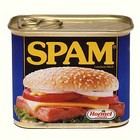How to fight spam

SPAM denotes junk mail, an important aspect of Internet privacy. It is a highly notorious word on the Net.
Companies, and individuals including some of our own friends bombard our mailboxes with junk mail on a 'regular' basis. There are veterans of spamming – the 'art' of sending junk mails - like Sanford Wallace who earned the nickname 'Spamford Wallace.'
The spammers use several intrusive methods to send junk mail. The Internet allows them to store our email addresses in databases that cross reference each other, so that they can build profiles that tell them details including what sites people visit, how often the sites are visited, how often banner ads are clicked, and what kind of products are purchased. Companies and individuals will happily sell information they collect to other companies and individuals, so that once an e-mail address is on one list, they'll eventually be on many many lists.
Here are some proven steps to avoid junk mail:
1. Don't give out the email address
May seem obvious. But don't give out the e-mail address to marketing companies. For example, any surveys we may fill out, or any form to fill out when purchasing something over the Internet. Some companies require our e-mail address before we can download software. In these cases, always enter a bogus address.
Also, don't include the e-mail address in the Web browser settings. Use a fake one, or leave the field blank. Web sites we visit can grab this information without us ever knowing about it.
In cases where we absolutely need to enter a valid e-mail in a form (for example when we need the company to send us a receipt or a product key), we should have a second e-mail address, preferably at a free e-mail service on the Web. We shouldn't bother if we get SPAM at that account, as it is meant to be a 'garbage bin' account. However, clean it periodically, and block unsolicited mails as required. The blocking and SPAM reporting facilities are part of many free e-mail services including Hotmail and Yahoo.
2. Don't list the email address on websites* or newsgroups
Instead of listing the private e-mail address on a personal website, use the second 'garbage bin' account, or a separate 'web feedback' account. Do the same with posts made on newsgroups. There are automated programs that scour the web and news groups to harvest e-mails.
3. Don't reply to SPAM
Never reply to junk mail asking them to stop. A lot of junk e-mails provide an 'unsubscribe' link, or ask to reply with 'remove' in the subject. This is a trick. The spammers don't actually know if our e-mail addresses are active. They purchase thousands of emails from other companies and sometimes even guess at e-mail names. As soon as we reply to junk mail, they will know that our e-mail is active. And we continue to get the junk e-mails on a 'priority basis'.
4. Filter out the SPAM
Filtering the junk e-mails that we receive, prevents them from reaching our in-box. Most e-mail programs have built-in filters to do this.
- - - - - - - - - - - - - - - - -
*Note that ConnectingSingles never sells or shares email addresses with any other party and the site never sends spam mail. Your email address is safe here.. unless you share it with someone. And there are site rules against posting email or personally identifiable information in public areas such as a forum, blogs, or profile narratives.